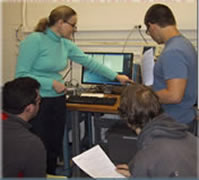|
This is the web site for the Advanced Nuclear Science Education Laboratory courses Chm246/446 & Phy245/446. Additional pages are accessible
via the navigation bar on top.
Main data management for participants is maintained in a Twiki site.
Goals of the ANSEL lab course: To provide students
with an understanding of our natural radiation environment, to provide hands-on experience
in detection of natural and artificial electro-magnetic and particle radiation, in
the use of instruments and methods
of electronic signal
processing, data analysis,
and in applications of
radiation in science and
imaging, destruction-free testing of materials.
The course is intended to be
conducted in terms of 2-3 per week in-person meetings.
However, should Campus health concerns arise, it may be given in a virtual or hybrid format, with a corresponding number of on-line lectures or workshops on the ZOOM platform. The links to ZOOM meetings will be posted here and on the Announcement page.
All are required to follow UR recommendations concerning wearing of face masks during class and lab meetings.
Even if not required, wearing a (properly fitted) face mask, and following strict hygiene protocol, are elements of a good health strategy.
This course follows the UR College Credit Hour Policy for 4-credit courses. The class meets once per week for a lab lecture plus two times per week for laboratory experiments. The course requirements also include regular out-of-class reading and preparatory assignments. Students are encouraged to use regular office hours held by instructor and TA, which are meant to answer questions and/or help students with understanding of reading assignments, data analysis procedures, and experiment reports.
Lectures:
Professor
W. Udo Schröder
Regular lab lectures on Mondays, 9:00-9:45h, Bausch & Lomb 407.
>>>> First Lab Lecture:
Thursday, January 18, 2024, 14:00-16:40h, in
Bausch & Lomb 407
Laboratory Experiment Sessions
Professor
W. Udo Schröder , Teaching Associates Kylie Lofton, Marcus Converse
Tuesdays, Thursdays 14:00-16:40h, Bausch & Lomb 154/156/177
Office Hours
W.
Udo Schröder:
Tuesdays and Thursdays, 12:00 - 1:00 p.m.,
Hutchison Hall (HH)
466
or, by appointment (275-8263), w.udo.schroeder@rochester.edu
Prerequisites
Some familiarity
with Calculus, principles of Mechanics, Electrodynamics, Thermodynamics, Quantum Mechanics, or by permission. Working knowledge of the Microsoft Office suite, specifically MSWord and MSExcel.
Synopsis
Introduction to natural radioactivity, interaction of radiation with matter
Principles of radiation handling and detection
Detection of alpha-, beta-, gamma radiation with specific detectors
Discrete signal processing electronics
Data acquisition with integrated digital signal processing DAQ system
Basic counting statistics, analytical procedures in spectroscopy
Radio imaging, PET scans,
Resonant absorption of gamma-rays (Moessbauer effect)
Cosmic ray muons, muon energy deposition and lifetime
Application of neutron activation of materials.
Reference Materials
The
course uses a variety of materials, including published review articles and chapters of textbooks
that will be made available for downloading from the site. Several
reference books are on Reserve in Carlson Library and in the ANSEL lab rooms.
Lecture materials
will be posted on this site. A manual with task definitions for ANSEL experiments is available for download (Manual).
G. F. Knoll, “Radiation Detection and Measurement (pdf)
P. R. Bevington and D. Keith Robinson, Data Reduction and Error Analysis in the Physical Sciences"(pdf)
Lecture notes and presentations will be posted (LectureNotes)
Assignments
Regular
homework assignment consists of completing notes and daily summaries in lab logbooks, studying assigned sections of the reference materials and topics associated with actual ANSEL experiments. Familiarizations with the DDC-8 data aquisition system requiring application of BlackBox software for the. Familiarization with data analysis software package IGOR.
Disclaimer
|
